| {{{name}}} {{{nativename}}} | |||||
|---|---|---|---|---|---|
| |||||
| {{{flag}}} Flag | |||||
| Anthem {{{anthem}}} | |||||
| {{{map}}} | |||||
| Capital Čachtice | |||||
| Languages {{{languages}}} | |||||
| Demonym {{{demonym}}} | |||||
| Government {{{government}}} {{{leadertitle1}}} First Sebastian I (first) Last Václav I (last) {{{leadertitle2}}} First {{{leader3}}} Last {{{leader4}}} | |||||
| Legislature {{{legislature}}} | |||||
| Area {{{area}}} | |||||
| Population {{{population}}} | |||||
| Currency {{{currency}}} | |||||
Old Czarist Deltaria, (Daralian: Staré Cisárske Deltársko, Ushalandan: Векѣ Делтарие Царистъ Vechea Deltarie Ţaristă, Rodshya: Старая Царская Делтария, Staraya Tsarskaya Deltariya, Doron Dreven Zarisk Deltæria, Akigan: Eald Cāserlic Deltaland, Hulstrian: Alt Zarist Deltarien, Tokundian: Стар Царске Делтарија Star Carske Deltarija), was a nation in central Majatra, and the heart of the Deltarian Empire. Despite possessing considerable mineral wealth and resources, Czárske Deltársko was classified as a developing nation, as constant power struggles and periods of outright anarchy curtailed her prosperity. However, as has been demonstrated many times over, the Deltarian lands and people were well-accustomed to civil strife and political unrest, and needed little time to stabilise and prosper under strong, unified leadership.
Politics
Overview
Deltaria was an absolute monarchy, with the the Czár presiding over the highest official seat of authority. However, in reality all national law was dictated solely by the Okhranka ; and at times, the Czár seemed to be nothing more than a figurehead and hostage of the internal politics of his secret police. Most legislative and executive decisions were devolved to the local nobles, wth each family maintaining a military wing, or Huskarle to defend their holdings and maintain civil order. Despite being vastly outnumbered, the Okhranka maintained a balance of power over the five noble families, by keeping a vested involvement in all law enforcement throughout the nation, constantly collating intelligence on every noble or lawmaker in the Empire, and ensuring that their assassins are capable of striking down any of them at any time.
The Czár
The Deltarian Czár was the highest authority of Deltaria, a hereditary ruler chosen from the closest, and eldest male descendent of the Lineykovská Dynastia. The position of Czár granted unlimited authority over every protectorate and colony of the Deltarian Empire, and limited authority in the tributary nations. The Czár was protected, and to a large extent controlled by his personal bodyguard and secret police, the Okhranka.
Czárist Advisory Council
The Czárist Court was a small group of the Czár's most favoured and valued advisors, chosen directly by the Czár himself from the ranks of the larger coucil, the Czárist Rada. The highest position in the Council was the Dvorný Radca, who maintains close ties with the Czár and counciled him on a range of issues, while others provided specialised knowledge and advice on subjects ranging from foreign affairs and land management to religious and cultural duties.

Czár Sebastian I
The Okhranka
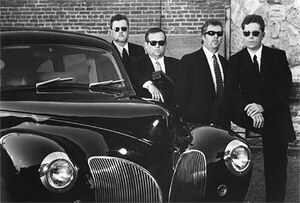
Okhranka 'General Duties' agents
The Okhranka represented the Crown's militant wing. The Okhranka had jurisdiction over the entire Deltarian Empire, and were responsible for protecting the Czár, forming and maintaining a national military, and keeping surveillance over all nobles within the Empire, maintaining loyalty to the Czár by any means necessary. The Okhranka were pariahs within Deltarian society, feared and reviled by serfs, freemen, nobles and clergymen alike. Their reign of terror had cast what is known as The Long Shadow over the Empire ; a deep-seated belief that the Okhranka are omnipresent and omniescent, observing everything and hiding everywhere, palpable even to foreign visitors in the nation. While the power of the Okhranka was far less than the Long Shadow suggested, the belief made their job much easier.
The Okhranka was excempt from many of the regulations nobles and freemen merchants found themselves bound by, and were able to freely recruit women and racial minorities. All forms of religion, however, were utterly banned within the Okhranka, and members were forbidden from attending worship services and would be retired from the Ohranka if suspected of harbouring illegal religious beliefs. Okhranka recruits were taken from a very young age, often from orphanages, and those who were not were orphaned by their recruiters. Okhranka members were also barred from marriage, parenthood, or establishing emotionally meaningful relationships with other human beings. The only love or sense of duty allowed to them was for the Czár.
The Church
The Terran Catholic Church retained a large measure of power in Deltaria even after being denegrated to a lower position by the Czárist reforms, holding administrative power over a small section of Darali known as the Holy Lands, receiving a huge amount of revenue from tax-free tithings, and maintaining their own private army of Huskarle. The bulk of the Church's power, however, lied in the hearts and minds of the millions of Deltarians who saw Boh as one of their only escapes from the misery of everyday Deltarian life.
Despite holding enough influence over the common folk to potentially overthrow Deltarian society, the officials of the Church had been sated by the luxuries piled apon them by the Czár and cowed by the constant presence of his Ohkranka rooting out malcontents, and preached subservience to the State above all else.
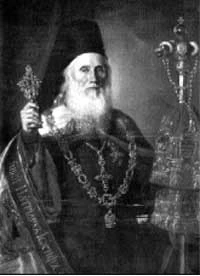
Pápež Pius III
The Pápež
The office of Pápež was the highest position within the Church, and Pápež was considered an infallible ambassador of God. While most decisions were delegated to Kardináls and Arcibiskups, the Pápež was legally authorised to control every aspect of legislature within the Holy Lands, and acted as both a Vojvoda of the Holy Lands as well as having authority over all churces and clergies within the Empire. The authority of the Pápež could only be legally challenged by the Czár himself, although the public ratifications of such an act made it a very seldom occurance. However, like anywhere else in Deltaria, legitimised authority was second only to the presence of the Okhranka, which took up residence throughout the Vatikan and the Holy Lands ; like everybody else, the Pápež lived under the Long Shadow.
The Holy Lands
While the Holy Lands technically comprised an area which included the city of Dolinka, the towns of Pradubice, Unicov and Kolin, and their surrounding hinterlands, the word was generally used to mean the bureaucratic headquarters of the Terran Patriarchal Church, a stately palace in the heart of Dolinka. In contrast to the rest of Deltaria, the Holy Lands were vibrant and rich with luxuries and extravagance second only to the castle of the Czár.
The economic output of the Holy Lands, however, was utterly negligable ; the entire region supporting on the enormous tithes offered to the Church. A small standing army had been raised from the local populace, but concerned itself with domestic police work only, as no noble would have been foolish enough to lay claim to the Holy Lands.
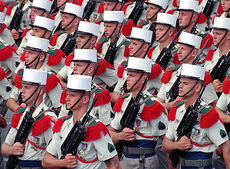
Insignia of the Legion
The Legion
The Czár's Palace in Cachtice was filled at any one time with an entity known as The Legion, an order of nobles, who were charged with the responsibility of acting as the legislative body, of ensuring the decrees passed by the Czár were duly recorded and distributed amongst the lower nobles, and acted as administrators for the national affairs of the nation. All legislative action fell under their jurisdiction, and they were closely monitored by the Okhranka. Although there were several noble orders active within the nation, ever since the founding of Czárist Deltaria the order charged with such a responsibility has been the Legiunea Sfantului Gheorghe, the Legion of Saint George, a sacred and ancient order first created to defend the Crown and the Hosian lands against enemies, particularly the Queranzaris of Majatra.
Geography
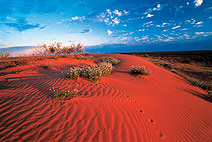
Great Deltarian Desert
Deltaria is located on the eastern limb of the Majatran mainland, running from the centre of the Majatran Basin all the way to the southern coast. She shares borders with the Independent Wantuni Republic to the east and Jelbé Isràé Krsyigad in the northwest. Lake Majatra represents an additional border in the southwest, while the nation borders with the South Sea, stretching from Ushalande across Alazinder and Dissuwa, and across the entire southern rim of the Border Marches. Much of the irrigation in the nation is provided by the enormous inland sea, Lake Majatra, and the two vast rivers, the Alazinder River and the Sluislaw.
Climate in Deltaria varies, from the tropics in northern Ushalande and Dissuwa, to a long temperate belt along the coast of the basin, and through the base of the Ushalande Horn. The southern inland area is marked by a harsh, arid landscape, with vast deserts such as the Great Deltarian Desert and the Darali Badlands. Deltaria's few mountain ranges follow the coastal temperate zones, and split the flat and lifeless horizon of the southern plains, while the southernmost expanses of Deltaria contain further temperate and even alpine climatic zones, punctuated by frozen bogs and marshes. Demographics
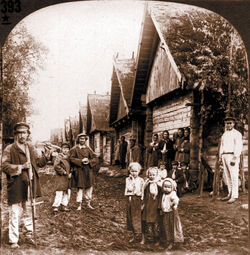
Deltarian peasants
«I never hated Majatrans. I just exterminated them.»
| |
(Ivanka Kováčová, Heroine of Deltaria)
|
Despite the attempts of the Oligarchy government to homogenize Deltaria in every way possible, the nation remained a vibrant melting pot of different ethnicities, cultures and even religions. While the most culturally represented ethnicities in Deltaria are the Delic people ; the Tokundians, Daralians and Alazindians, they have not been the majority ethnicity since the expansion of Deltaria in 2312. There are also significant minorities of Dorons, Akigans, Ushalandans and Dissuwans, with smaller populations of Jews, Jelbeks, Selucians, Dundorfians and Gaduris living within Deltaria. Although ignored in government census and not counted as part of the national population, there are also large populations of Arabs and Roma living in Deltaria. Within the inclusion of the Border Marches, where the vast majority of Deltarians live, the nation is primarily comprised of Jelbeks, Roma, Majatrans, Jelbe-Wantunis and Coburans.
The state religion of Deltaria, Terran Catholicism, was estimated to be by far the most prevalent of religions even after taking into account the suppressed religions practised throughout the nation, often completely allowed by the authorities, depending on the location and noblemen in power at the time. In some areas, churches and other places of worship are built freely, where the official members of the Terran Catholic Church worship according to their actual beliefs. Outside of the Holy Lands, little attention is paid to which religion is actually observed by the common Deltarians, provided they continue to pay their tithes to the Deltarian Church. After the 2312 expansion of Deltaria, the majority religion is now considered to be Shi'a Islam, despite its illegality. Other minority religions include Asatru in Doron Akigo, Judaism, Tokundian Orthodox Christianity, Akigan Prodestantism, and Coburan Catholicism.
The only place where any religious beliefs are actively restricted and membership of the Catholic Church is not enforced, is within the ranks of the Okhranka, where atheism is required and attending any worship services is banned.
Culture
«We have a culture, a strong, vibrant, 'real' culture. Most of the outside world does not. They haven't bled enough for it.»
| |
(Barón Lászlo Nádašdy, Dissuwan Baron)
|
Northern Deltaria retains a primarily agrarian culture, where folk tradition and family plays a role far stronger than that throughout most of Terra. Decades of cultural suppression by the Oligarchy's New Traditions campaign made little impact on the Deltarian peasantry, and millenia-old rituals are still observed. While Deltarians hold enormous amount of pride in their culture, xenophobia is still deeply ingrained in the national psyche, and they are suspicious instead of flattered by other nationalities showing an interest in them. This, coupled with the nation's restrictive border controls have made tourism in Deltaria a wildly valued experience amongst the young, educated upper-class in Artanian and Seleyan nations, who vie for the right to gain an entrance visa to Deltaria and witness peasant traditions such as Deltarian Easter or the burning of the Morena firsthand.
The largely ignored culture of Southern Deltaria has garnered little recognition overseas, and is suppressed by northerners as inferior. However, many aspects of the culture are based on the geography, literature and music of the people. The culture is similar and yet distinct from many of the bordering peoples like Coburans and Wantunis, as well as nearby Arabic nations such as Kafuristan and Al'Badara. Southern culture has strong influences from most of its Islamic neighbors, as well as an underlying influence from the rest of Deltaria.
Economy
«The experience of ages has shown that a man who works on the land is purer, nobler, higher, and more moral... Agriculture should be at the basis of everything.»
| |
(Nikolai Gogol, Deltarian writer)
|
Deltaria relied on a slave-based feudal economy, with the vast majority of citizens afforded the status of serfdom, tied to their lords as slaves with very few human rights. The noble lords are each afforded a fief to administrate, paying taxes to the Czár and tithings to the church from the profits made by their serfs, referred to in finance terms as "souls". As long as the amount of paid taxes are agreeable, little attention is paid by the higher nobles as to how they are actually earned.
The majority of the northern workforce is agricultural, mainly tending to pigs, goats, sugar cane, wheat, tobacco, and somniferum ; although industries have sprung up throughout the northern and central fiefs as noble lords attempt to better their status. The bulk of heavy industry is located in the Border Marches, the most populated and poorest area of Deltaria, where factory-workers toil under appalling conditions, often at risk of life and limb. Sugar refineries, rubber works, textile mills and food processing plants make up the bulk of Deltarian industry, although a large amount of revenue is gained through illegally exported heroin and cocaine, unofficially sanctioned by the nobles of the northern fiefs.
Exploitation of luxury resources also makes for a thriving economy in the fiefs of the luckier nobles, who control underground oil deposits, valuable metal seams, and diamond troughs in the northern jungles. A dearth of demand in Deltaria ensures that most of these resources are shipped overseas, at low prices, where they are campaigned against heavily by civil rights leaders due to the inhumane manner in which they are produced.
